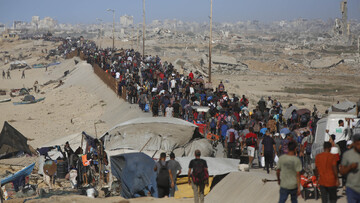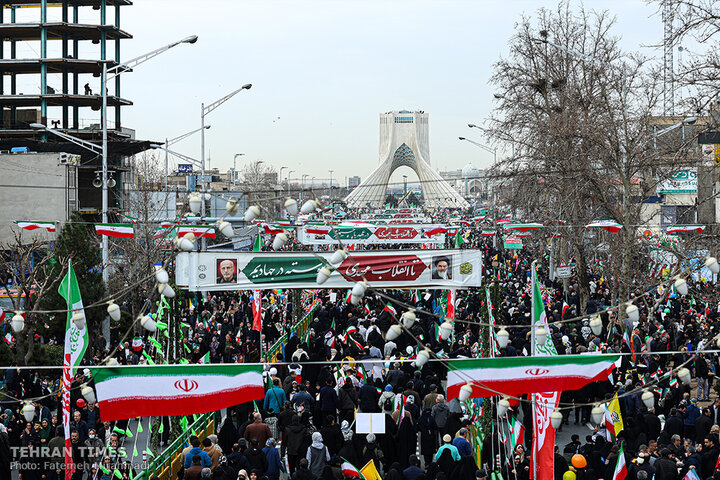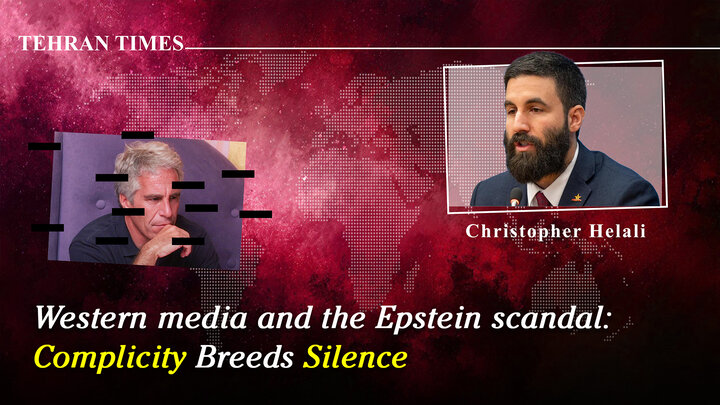-
 2026-02-28 14:28
2026-02-28 14:28
Iran’s Foreign Ministry vows ‘decisive defense’ after US bombs negotiating table a second time
TEHRAN — Iran’s Foreign Ministry Spokesman Esmaeil Baghaei condemned Saturday’s military strikes by Israel and the United States, asserting that the country’s armed forces would decisively defend its sovereignty.
-

Iranian missiles hit five key US bases
TEHRAN - At least five key U.S. military bases in the region have come under heavy fire from Iranian missiles, as Iran continues to respond to the U.S.-Israeli attacks that targeted Tehran and other Iranian cities Saturday morning.
-

IRGC attacks Israel after US-Israeli strikes on Iran
TEHRAN - Iran has initiated a military response against Israel, launching missile and drone attacks on Israeli targets in the occupied territories less than two hours after the regime, together with the United States, conducted airstrikes on Tehran and other Iranian cities Saturday morning.
-

53 students killed in US-Israeli strikes on elementary school
A girls’ elementary school in the southern Iranian city of Minab was directly struck during Saturday’s US-Israeli attacks on Iranian cities, according to Iranian authorities.
-

By Mona Hojat Ansari
A shaky step forward
Iran and US advance nuclear talks but there are no clear signs Washington will keep diplomacy alive
TEHRAN – Iran and the United States held what Iranian officials described as their “most serious” round of nuclear negotiations in Geneva on Thursday, agreeing to continue discussions in Vienna next week, but developments across the region suggest Washington may still be leaning toward a military confrontation—an outcome that several regional governments have warned would be devastating.
-

By Shahrokh Saei
From headlines to hostilities: How Israel and US media beat the drums of war with Iran
TEHRAN – The latest episode of The Tucker Carlson Show has intensified debate over who is pushing the United States toward confrontation with Iran.
Politics
-

‘Practical’ proposals discussed in Iran-US talks: Tehran
TEHRAN- Iran says that “important” and “practical” proposals were advanced during negotiations in Geneva on Thursday morning on Iran’s nuclear program and the lifting of sanctions.
-

Offense within a defensive formula
LONDON - Two factors arising from miscalculation may prompt the U.S. to attack Iran. The first miscalculation is that Iran is in its weakest state, as claimed by U.S. Secretary of State Marco Rubio in his address to Congress.
-

Six terrorists killed in IRGC ambush in southeast Iran
TEHRAN – In an ambush on Tuesday night, troops from the Islamic Revolution Guards Corps (IRGC) have killed six members of the Jaish al-Adl (known in Iran as Jaish-al-Zulm) terrorist group in an ambush near the border city of Saravan in the southeastern province of Sistan-Baluchestan.
Sports
-

Iranian women carry the hopes of a generation
TEHRAN - As the 2026 AFC Women’s Asian Cup unfolds in Australia from March 1–21, few stories are as inspiring and hard-earned as that of Iran’s women’s national football team. For only the second time in its history, Iran have qualified for this premier continental tournament, a milestone that reflects both sporting progress and social resilience.
-

Iran lose to Jordan at FIBA World Cup Qualifiers 2026
TEHRAN - After threatening to break the FIBA World Cup Qualifiers all-time scoring record in Window 1 with a 42-point masterpiece, Harris was back at it again.
-

Iran to play friendly matches to prepare for 2026 Asian Beach Games
TEHRAN – Iran beach soccer coach Ali Naderi said on Friday Team Melli are going to play several friendly matches as part of preparation for the 2026 Asian Beach Games.
Culture
-

“Sami” to compete in 2nd Sapienza Film Festival
TEHRAN – Iran’s first Arabic-language drama “Sami” written and directed by Habib Bavi Sajed will compete in the main competition section of the 2nd Sapienza Film Festival, set to be held from March 4 to 7, in Napoli, Italy.
-

Arasbaran Cultural Center to review “Nuremberg”
TEHRAN- “Nuremberg”, a 2025 movie by American film director and screenwriter James Vanderbilt, will be reviewed at the Arasbaran Cultural Center in Tehran on Sunday evening.
-

Tehran theater to host reading performance of Stoppard’s “A Separate Peace”
TEHRAN- Sahne-ye Abi Theater in Tehran will be playing host to a reading performance of British playwright and screenwriter Tom Stoppard’s “A Separate Peace: A Play in One Act” on Tuesday.
Economy
-

NIDC drills 116 oil, gas wells in 11 months, up 23% year-on-year
TEHRAN – National Iranian Drilling Company (NIDC) drilled and completed 116 oil and gas wells in the first 11 months of the current Iranian year (March 2025-February 2026), marking a 23 percent increase compared with the same period last year, a senior official at the company said.
-

Iran’s exports to Qatar rise 34%, trade balance turns positive
TEHRAN – Iran’s non-oil exports to Qatar rose 34 percent in weight and eight percent in value in the first 10 months of the current Iranian year (March 2025-January 2026), reaching $122 million, while lower imports shifted the bilateral trade balance into surplus in Iran’s favor.
-

Non-oil goods worth nearly $5b exported from Khuzestan in 10 months
TEHRAN- As announced by a provincial official, 17.029 million tons of non-oil commodities valued at $4.925 billion were exported from Khuzestan province, in the southwest Iran, during the first 10 months of the current Iranian calendar year (March 21, 2025-January 20, 2026).
Society
-

National energy management program implemented in 120,000 schools
TEHRAN – According to the ministry of education, the national program for energy management has been implemented in 120,000 schools so far.
-

Over 8,850 prisoners of involuntary crimes freed this year
TEHRAN – A total of 8,859 prisoners of unintentional crimes have been released from prison so far in the current Iranian year (which began on March 21, 2025).
-

Over 2,000 students attend Kid Code tech competition
TEHRAN – Some 2,180 students have participated in the fifth edition of the national scientific and technology competition known as Kid Code. This year, the competition was held on February 26 and 27 at Tehran Permanent International Fairgrounds, attracting students from 28 provinces of the country.
Tourism
-

Study sheds new light on UNESCO-listed Khorramabad Valley Prehistoric Sites
TEHRAN – A new scientific article on the Chalcolithic and Bronze Age periods in the Khorramabad Valley has been published in the latest issue of the journal of the National Museum of Iran, the head of Lorestan’s Cultural Heritage Department said on Friday.
-

National eco-lodge training workshops launched
TEHRAN – National training workshops for eco-lodge operators have begun across Iran, the head of the Iranian association for eco-lodge operators said on Saturday.
-

Bread wrapping; a motherly ritual during Ramadan
TEHRAN-- In the old alleys and traditional neighborhoods of Bushehr province, a motherly ritual called ‘noon pooshi’ (bread wrapping) is held with the arrival of Ramadan.
International
-

From Gaza to the Red Sea: Why Israel now calls Yemen its ‘nightmare’
TEHRAN – Yemen’s Ansarullah movement has been a thorn in the side of Israel since the inception of the genocidal war on Gaza. From the earliest weeks of Israel’s military campaign in October 2023, Sana’a made clear that it would not remain a passive observer. By mid-November 2023, the Ansarullah movement had begun targeting vessels it identified as linked to Israel or bound for Israeli ports.
-

Lebanon: IMEC pressures, the fading ‘mechanism,’ and the open debate on normalization
SOUTH LEBANON — Lebanon today stands at the intersection of three converging tracks: the collapse of the ceasefire supervisory “Mechanism,” mounting geopolitical pressure through the India–“Middle East” –Europe Economic Corridor (IMEC), and deep uncertainty surrounding parliamentary elections.
-

From denial to doctrine: The Zionist approach to Palestinians
TEHRAN – The Israeli regime’s approach to the Palestinian Nakba has shifted from denying it happened to using indiscriminate force as a deliberate policy tool.
Most Viewed
-
Iranian missiles hit five key US bases
-
IRGC attacks Israel after US-Israeli strikes on Iran
-
53 students killed in US-Israeli strikes on elementary school
-
Iran’s Foreign Ministry vows ‘decisive defense’ after US bombs negotiating table a second time
-
Oman, Iran confirm ‘significant progress’ in Iran-US talks, technical discussions to start Monday
-
From headlines to hostilities: How Israel and US media beat the drums of war with Iran
-
Iran, US hold nuclear talks in Geneva, Oman presents Tehran’s proposals to US
-
Iran, US restart talks after a break
-
A shaky step forward
-
Tehran says Iran-US talks conducted with ‘great seriousness’
-
Iran Armed Forces to take out US troops, equipment in case of war: senior general
-
Qatar Airways maintains daily Tehran-Doha flights
-
Oman FM: Iran, US ‘exchanging creative and positive ideas’
-
‘Practical’ proposals discussed in Iran-US talks: Tehran
-
US insists on ‘limiting’ Iran's enrichment in Geneva talks, source says












